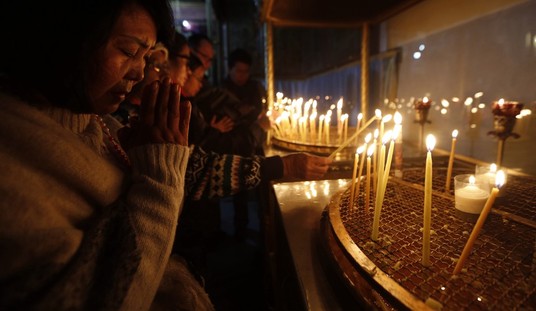Several former DOJ employees have been in contact with Pajamas Media, interested in publicly supporting J. Christian Adams as he comes forward about the DOJ’s failure to enforce the country’s laws from a race-neutral perspective.
These former DOJ employees have expressed a willingness to go on record regarding Adams’ professionalism, excellent performance, and outstanding record of enforcing the law without racial bias.
Additionally, they would like to corroborate Adams’ statements about the DOJ.
And perhaps — pay attention, DOJ press liaisons — offer their own accounts regarding the DOJ’s hostility to race-neutral law enforcement.
Watch this space today, and over the next few days, for additional statements from former DOJ employees.
First, here is Asheesh Agarwal. From 2006-2008, Asheesh Agarwal served as a deputy assistant attorney general in the Civil Rights Division. In that position, Agarwal supervised the Division’s Voting Section, which included Adams, and worked directly with Adams on several matters. Agarwal is currently an attorney in private practice.
During his tenure with the Department of Justice’s Voting Section, J. Christian Adams was a model attorney who vigorously enforced federal voting rights laws on behalf of all voters, without respect to race or ideology. Mr. Adams was also one of the most productive and successful voting attorneys in recent memory.
His victories include two cases on behalf of African-American voters under Section 2 of the Voting Rights Act, two cases on behalf of white voters under Section 2, and six cases on behalf of Hispanic voters under Section 203 of the Voting Rights Act. He also brought and won three cases on behalf of military voters. Having worked closely with Mr. Adams for several years, I can attest to the unsurpassed quality of his character, judgment, and commitment to the cause of civil rights on behalf of all Americans.
— Asheesh Agarwal
UPDATE: Mark Corallo, former Department of Justice director of public affairs, submits a statement to Pajamas Media:
As the Department of Justice director of public affairs under Attorney General John Ashcroft, I witnessed the hostility of the “career” Civil Rights Division attorneys firsthand.
Internal disagreements over policy routinely became matters for the press, via leaks to reporters or leaks to Democrat members of Congress. They had no compunction about breaking the ethical requirement of attorneys to keep those internal deliberations confidential.
I am not surprised that the Department is attacking J. Christian Adams. The Civil Rights Division attorneys have no interest in the rule of law as written and passed by Congress — the New Black Panther case is glaring proof that the Division has an agenda. If Congress was truly interested in oversight, there would be hearings on this case and others.
J. Christian Adams did the honorable thing in resigning and speaking out.
Democrats constantly complained about the lack of oversight when Republicans were the majority party in Congress. Can any reasonable person imagine the Democrats ignoring a case of blatant violations of the Voting Rights Act (captured on video) brought by career Civil Rights Division attorneys being dismissed by a Republican attorney general?
Any veteran of the Justice Department should be outraged.
UPDATE: Robert Driscoll was a Deputy Assistant Attorney General from 2001-03. He is now an attorney in private practice:
When I served as chief of staff and deputy assistant attorney general in the Civil Rights Division under John Ashcroft, I became familiar with the internal politics of the Division, and am therefore not surprised by the accounts of J. Christian Adams describing the New Black Panther voting case.
While I met many excellent lawyers in the Division dedicated to the rule of law, too many of the the career staff (a term never to be confused with “apolitical”) viewed the role of the Civil Rights Division as simply that of a government-funded advocacy group whose responsibility was to work on behalf of favored political and agenda-driven constituencies — and not to neutrally apply the law (as written by Congress, and interpreted by the courts) to the facts.
In contrast, as a private attorney I encountered J. Christian Adams (and other voting section members, including then Chief Christopher Coates and Deputy Chief Tim Mellett) while handling a voting rights matter against the DOJ. Adams and the rest of the team acted professionally and consistent with their understanding of the law and facts. While I disagreed with Mr. Adams and the DOJ team on some matters of interpretation, I could not have told you the political views of Mr. Adams or any of the attorneys I encountered based on my interaction with them.
Moreover, the position taken by Mr. Adams in that case was certainly not pushing any conservative agenda, as the suit sought to increase African-American representation on an elected body (based on ambiguous evidence of vote dilution) and resulted in the adoption of a voting plan designed to enhance the ability of minority voters to influence the outcome of elections.
While it is certainly within the authority of the senior levels of the DOJ Civil Rights Division to make the final litigation decision on any case, including the New Black Panther matter, it would seem to me that dismissal of that case — after default has been entered and where video evidence exists — is a highly unusual decision that is worthy of congressional oversight. While some may cast such oversight in partisan terms, it need not be.
The video of the defendants in the Black Panther matter was seen by millions. While most have not studied civil rights law or the Voting Rights Act in detail, viewers of the video assume that the kind of conduct shown in the video is inappropriate at a polling place. A lawsuit was filed by experienced voting rights lawyers at DOJ to remedy the situation and prevent such future conduct. And yet the case was dismissed voluntarily by the DOJ (after a shift in administration), a result that seems — at a visceral level — strange to anyone who has seen the video.
The detailed testimony of the decision-makers (not the subsequent appointee who was not around at the time of the decision) would be enlightening and educational. If the dismissal of the case against the Black Panthers was a result of political influence (as Mr. Adams alleges — an allegation that does not seem far-fetched, based on my experience), that is important to know. Political decisions can have political consequences and one can imagine there would be consequences if a political appointee “weighed in” on behalf of a fringe group like the New Black Panthers. But even if the DOJ is correct that no political influence played a role, oversight is perhaps even more important.
If this is indeed the view of senior career DOJ staff — that after reviewing the facts of the New Black Panther case and the video, current laws against voter intimidation provide no ability for the DOJ to properly bring an action against the New Black Panther members shown on video and mentioned in the lawsuit — then Congress needs to have a conversation with Attorney General Holder about whether the problem lies with the Voting Rights Act itself, or with those whose job it is to enforce it.









Join the conversation as a VIP Member